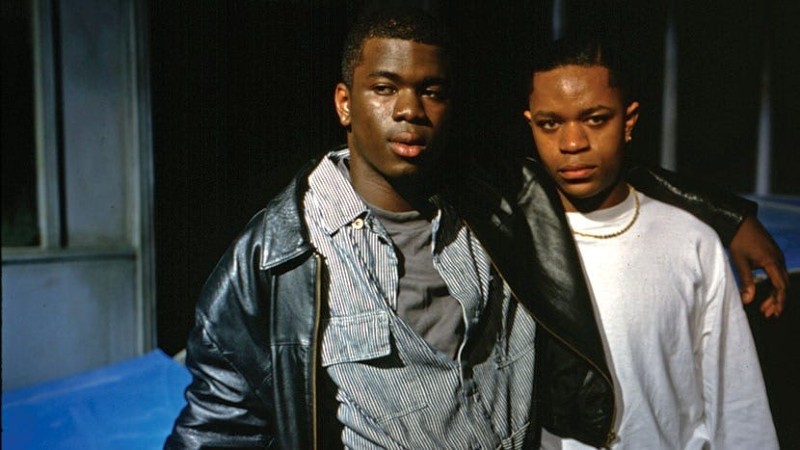




With an Isaac Julien retrospective just opening at Tate Britain it’s perhaps an illustration of how the filmmakers work is considered and received, and that is mostly outside the parameters of traditional filmmaking. The internet labels Julien foremost as an installation artist, one who incorporates politics, academic research, activism, and anarchism. In the instance of Young Soul Rebels (1991), he was as a daringly creative queer and radical young gay black man. Even if Young Soul Rebels lends itself to be critiqued as a film, it is still exemplary all of Julien’s sensibilities as a visual artist.
Re-released this week and coinciding with 6 screenings at the British Film Institute, Young Soul Rebels is a vibrant pre-Aids tale filled to the brim with effervescent youth and determined hopefulness in the face of structural inequality. Set in 1977 over the Queen’s Jubilee, the essence of the film lies in the childhood friendship of Chris (Valentine Nonyela) and Caz (Mo Sesay), one is straight, and one is gay/bi, respectively. Hosting funk-soul shows on a pirate station broadcasted from an East London garage, the two have big aspirations of illustrious Radio DJ careers. That is until the murder of their gay friend cruising in the local park, entrapping them both with the police eager to pin the murder on them. Whilst nurturing love relationships, Chris with Tracey, an aspiring radio producer (debut feature by Sophie Okonedo), and Caz with Billibud (Jason Durr), a lovestruck puppy dog in the guise of a socialist punk.
Obviously, music is the motivation for the boys, a route out of their council estate doldrums. It backgrounds every single scene and complements the film’s diligent attention to fashion, which is very much borrowed from the street, pooled from the plethora of subcultures of the time, paying homage to Julien’s Central St Martins education. Its DIY aesthetic along with its queer, punk impressions, and the impromptu, theatrical, and intermittently comedic style of the acting, nods heavily to Derek Jarman’s films, specifically Jubilee (1978). Julien cites Jarman as a major influence; opting out of realism for a more affected approach but still allowing for real-life trauma and political commentary to permeate through and drive the narrative.

Before Young Soul Rebels, Julien had released a series of video shorts throughout the ’80s, as part of the Sankofa Film and Video collective, a group of London art students “dedicated to developing an independent black film culture in the areas of production, exhibition and audience”. Then came the seminal Looking for Langston (1989), one of the spearheads for New Queer Cinema, a beautiful black and white mix-media experimental meditation which was Julien’s attempt to re-write history by queering the poet Langston Hughes during the Harlem Renaissance. Pre- and post-Young Soul Rebels Julien’s films haven’t been as narratively linear or adhered to any cinema release schedule or made themselves available to be consumed as a regular film. Embracing his guise as a visual artist, his work is predominantly shown within museums, galleries or screened at site-specific spaces.
In Young Soul Rebels, also part of the New Queer Cinema canon, Julien sought to be more self-referential, turning his attention to Britain and to depicting black queer characters. Perhaps in a bid to investigate the then British attitudes towards race, immigration, class, masculinity and LGBT+. As Caz and Chris navigate a white 1970s’ Britain, jarringly during the celebration of Britain’s colonial figurehead, we see how their social ostracisation and segregation plays out. It appears on all fronts, whether it be everyday racial abuse from neighbours or broader systemic racism from governmental and cultural institutions but also by their own cohort whether it’s for being gay, for daring to follow their dreams to transcend beyond the confines of their council estate.
Yet despite all the adversity there is positiveness that seeps through Young Soul Rebels: the music, the abundance of colour, the larger-than-life young characters, and the unabashed portrayal of queer love; it all still feels very fresh and exciting. If there is any of Julien reflected in Caz and Chris, judging from the outside, looking at his work and what he has achieved retrospectively, it looks like he has very much transcended.
Young Soul Rebels is in cinemas on Friday, April 28th.





















